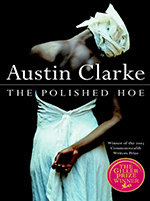 The Polished Hoe has been on my to-be-read this for about a decade, but I’ve come to the unfortunate conclusion that, for a number of reasons, it’s just not for me. This is not to say I thought the book was bad—far from it. Clarke’s account of the abuses of plantation life and the way it warps the people of the island and their relationships is deeply affecting. His characters have tremendous depth, especially Mary-Mathilda, and her narrative is truly heartbreaking. You’re expecting me to say but, and here it comes: there were a number of mechanical issues in The Polished Hoe that I just couldn’t get past.
The Polished Hoe has been on my to-be-read this for about a decade, but I’ve come to the unfortunate conclusion that, for a number of reasons, it’s just not for me. This is not to say I thought the book was bad—far from it. Clarke’s account of the abuses of plantation life and the way it warps the people of the island and their relationships is deeply affecting. His characters have tremendous depth, especially Mary-Mathilda, and her narrative is truly heartbreaking. You’re expecting me to say but, and here it comes: there were a number of mechanical issues in The Polished Hoe that I just couldn’t get past.
I’ve never been a fan of novels built almost entirely out of dialogue, and it didn’t work for me here either. In some ways The Polished Hoe reminds me of The Recognitions, by William Gaddis. Almost all of the thematic heavy lifting is done through the dialogue in both books, and likewise the most interesting and beautiful writing in both happens in the spaces between. The problem is that interesting and beautiful writing becomes overwhelmed—by inanity in The Recognitions and by repetition in The Polished Hoe. There was no part of Mary-Mathilda’s tale, or even the Sargeant’s, that I felt I read fewer than three times. I had similar feelings about Anne of Green Gables, where I wished I’d had more of L.M. Montgomery’s voice and less of Anne’s; in The Polished Hoe I wish I’d been given more of Clarke’s and less of Mary-Mathilda’s or Sarge’s. Anyway, a typical exchange looks something like this:
“The first girl!”
“Ruby, then!”
“Ruby, the first-daughter.”
“In domestic work, isn’t she?”
“Domestic work.”
“You ever see the mother?”
“The mother left for Demerara sixteen months after Ruby born.”
“And never looked back?”
“Never looked backwards to see what happen to her own thrildren.”
“And the second child?”
“Pass-away.”
“Lord-have-His-mercy… may she rest…”
“…in peace…”
“Domestic work up in Brooklyn, eh?”
“Engineering, is what they calls it by, in Brooklyn. Domestic engineering.”
“Domestic engineer.”
“Nevertheless.”
“Nevertheless.”
This definitely feels like a realistic exchange,[ref]I had a problem getting a handle on the rhythms of Barbadian speech, but that was an issue with me, not the book.[/ref] and the repetition is fine in a few conversations, but it was so constant and so extreme that I found it numbing, and I had to fight to maintain focus and to give the book my full attention. And it’s not just the dialogue—the stories and anecdotes repeat, too.
At the core of The Polished Hoe are two mysteries, or at least extremely important facts that the characters are talking around, telling stories of their shared past and exploring the relationship they never got to have to avoid revealing those mysteries or facts. After more than 450 pages[ref]462.[/ref] of conversations in which Mary-Mathilda and Sarge did everything in their power not to come to the point, it dragged hard. I had figured out the truth of those two mysteries, or the two facts Mary-Mathilda and Sarge were trying so hard not to reveal, by page eleven. I even put the book down when I reached that page, and said the two secrets out loud.[ref]Turns out I was completely right.[/ref] I have always been impatient with books and films in which characters try desperately not to reveal to each other important things that they have every reason to blurt out immediately—honestly, it’s mostly a bullshit technique, a way of manufacturing suspense that truly does not come from either the plot or characters, its use considered amateur-hour in genres where suspense is more central—and that was literally the entirety of this book.
There is so much in The Polished Hoe that is powerful and interesting: the deep examination of the way race and class work on the island to push people into situations where they aren’t truly accepted by either the white or black communities, but where they have no power to escape the expectations of either. How Wilberforce’s European education is a source of both pride and anxiety. How the power of the police is limited by both the plantation’s money and the identities of its individual officers. The truly horrific way that the people of the island have been denied their history—to the point where Sarge doesn’t even realize that slavery existed on Barbados, even though it may still have been part of living memory for the oldest islanders when he was a child. The list could go on. It’s unfortunate that the mechanics of the novel didn’t come through for the themes and characters, that instead they held them back, dragging like an anchor across the ocean floor.